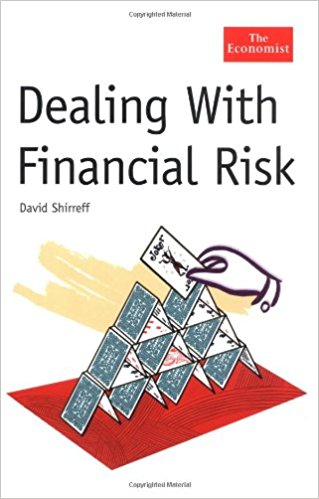Dealing with Financial Risk Summary
5 min read ⌚
 Prepare yourself for a battle just like those highly decorated generals who were fighting for honor.
Prepare yourself for a battle just like those highly decorated generals who were fighting for honor.
Risk managers must embrace conflict, which will automatically trigger a defense mechanism.
Who Should Read “Dealing with Financial Risk”? And Why?
The economy has a significant influence on our behavior. As people living on this planet, we’ve experienced hard times which forged us into capable investors and financially orientated professionals. The Great Depression and the oil crisis in the 70s helped us to understand how the economy actually works.
“Dealing with Financial Risk” is a book that covers many topics related to the management of finances. The materials for this financial guide were collected from the author’s published articles that he wrote during the 1990s (a period of progress and digital innovation).
We highly recommend this magnificent financial book to financial professionals, potential investors and to the overall audience eager to learn more about handling a financial crisis.
About David Shirreff
 David Shirreff was born in 1947 shortly after the end of WW2. During his career, he spread the financial knowledge to other people unselfishly. Currently, he has a responsible role as a Frankfurt correspondent covering business and finance topics.
David Shirreff was born in 1947 shortly after the end of WW2. During his career, he spread the financial knowledge to other people unselfishly. Currently, he has a responsible role as a Frankfurt correspondent covering business and finance topics.
Back in the days, David worked as the capital markets editor of The Economist located in London. He wrote the book Euromoney, and in 1987 co-founded the Risk magazine.
“Dealing with Financial Risk Summary”
At the beginning of the 70s, the Yom Kippur War which engulfed the region made a mess of the world. The Arab countries took advantage of the situation as devoted members of the Organization of Petroleum Exporting Countries (OPEC) and embargoed oil supplies to other nations which led to a massive petroleum-boom (referring to the price).
According to experts, the middle east has planned this operation in order to inflict new policies on the Westerners including both the U.S. and Great Britain. After the Great Depression that demoralized the world in the early 30s, a new crisis set foot in different place affecting everyone.
Companies could no longer afford the privilege of importing oil, because of the price which was continually rising. The all-around effect was devastating; the world economy was seconds from a total collapse. The rising cost of oil produced new prices for other products and services that most of the people could not afford.
To make matters worse, the oil producers’ bank deposits had a tremendous effect on the world development. These banks had money but lacked investors interested in bank loans. Something had to be done; the capital was trapped between rich oil-producers and the difficulty of finding a profitable business in the new crisis.
Bankruptcy was out of the question, many companies refused to sign these papers and postponed the inevitable end. Banks started one dangerous strategy, the worst nightmare for every creditor. Operating on the belief that third-world countries mostly from Eastern Europe and Latin America would manage to avoid going bankrupt.
As a consequence of the new philosophy, money was not lent to creditworthy investors or countries – putting the oil-producers’ capital at high risk. In the early 80s, the U.S. and Great Britain attempted to confront the inflationary spiral by raising the interest rates to previously mind-boggling levels.
At one point, the interest rates on the dollar hit an incredible 22 percent. Desperate to avoid total economic collapse, these two Global Leaders created an issue for the state debtors. High-interest rates logically create a greater demand by the people – which caused a dollar decline, something expected in such business environment.
The only winners were the Latin countries, they benefited from foreign exchange unlike anyone else.
David Shirreff was one of the first people out there, brave enough to presented techniques for fighting the oil-crisis. The financial risk existed even in ancient times, although the countries back then didn’t know much about it.
Inflation appeared before WW2, at the time, the shock it caused was too powerful because no-one was prepared to take the blow.
Banks place inflation at the very center of happenings since its power can overthrow any government or business.
Are you an artistically orientated person, even if the economy is not a subject interesting to you, you should not miss the opportunity to educate yourself.
Key Lessons from “Dealing with Financial Risk”
1. Play smart, don’t rely on others
2. Find the best option
3. Deal with the unexpected risk
Play smart, don’t rely on others
Indeed, the unexpected happens quite often, perhaps even on a regular basis. Banks have lost their power on numerous occasions in the past; the same thing goes for the financial system.
They and the insurance companies, for instance, are competing against each other.
Playing on “forbidden” fields is an attempt to lure potential clients.
Find the best option
A possibility is equal to choice. The financial aspect allows us to manage our capital, or in other words be in charge of our lives.
Market’s variableness is known to each one of you when the price of some goods fluctuates as a consequence of various factors – the contra effect is triggered.
Deal with the unexpected risk
Banks and regulators have difficulties managing the process related to the adoption of valuable standards willing to contribute to the risk management preparations.
However, the history has displayed the financial systems’ inaccuracy when trying to invent quantitative models for dealing with the unprecedented risk.
Like this summary? We’d Like to invite you to download our free 12 min app, for more amazing summaries and audiobooks.
“Dealing with Financial Risk” Quotes
A financial crisis is not just about numbers that do not add up. It is about the players and regulators who make up the market. Share on X Recently it has seemed that whatever kind of diversity was sought, it has proved less diverse than expected. One possible reason is that investors move in herds. Share on X Risk managers are astonished at how important their profession has become. Share on X Every model, whether it is an aspect of the financial markets or anything else...will behave differently from the real thing, especially in extreme conditions. Share on X Derivatives cannot come with enough health warnings. The reason is their ability to accelerate gains or losses, often for little initial outlay. Share on XOur Critical Review
The easiest way to do it is by reading “Dealing with Financial Risk” a book which acts more like a financial-guide. Handling the world is connected with serving the interests of your community including yours.
David Shirreff allows you space to carefully choose the chapters you find amusing; you are not compelled reading the entire book. Don’t trust too much in the economy, place confidence in your financial forecasting abilities which are about to be sharpened by David’s inspiring methodology.
Emir is the Head of Marketing at 12min. In his spare time, he loves to meditate and play soccer.







